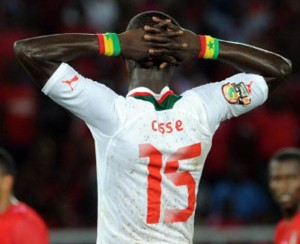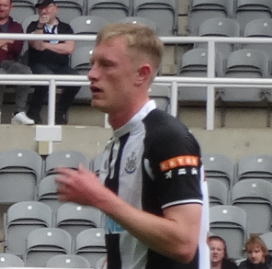Hull City (home): An Alternative Review
On Tuesday night I dived into a local restaurant seeking shelter from one of the many  thunderstorms that have caused heavy flooding, a loss of running water and just general turmoil to Dakar’s streets over the summer. I’d spent the previous Saturday searching all the streets of centre-ville in an attempt to catch the Villa match but had had no success. I’d come to the conclusion that the ‘watching the match in the pub’ culture that we grow-up on at home just wasn’t going to happen in this fairly orthodox Muslim pocket of Western Africa. I was pleased to be disproved when the waitress ushered me through the main restaurant and to a covered outside area with picnic tables, plastic garden chairs and most importantly a whopping-great-big telly with Canal + on. On the screen was Wayne Rooney, wearing what looked like a black cummerbund tied around his head, like a pissed bloke at a wedding. Having only managed to see ten minutes before the thunderstorm cut-out the power I vowed to return on Saturday to catch the weekend’s Premier League action and, most importantly, Newcastle United versus Hull City.
thunderstorms that have caused heavy flooding, a loss of running water and just general turmoil to Dakar’s streets over the summer. I’d spent the previous Saturday searching all the streets of centre-ville in an attempt to catch the Villa match but had had no success. I’d come to the conclusion that the ‘watching the match in the pub’ culture that we grow-up on at home just wasn’t going to happen in this fairly orthodox Muslim pocket of Western Africa. I was pleased to be disproved when the waitress ushered me through the main restaurant and to a covered outside area with picnic tables, plastic garden chairs and most importantly a whopping-great-big telly with Canal + on. On the screen was Wayne Rooney, wearing what looked like a black cummerbund tied around his head, like a pissed bloke at a wedding. Having only managed to see ten minutes before the thunderstorm cut-out the power I vowed to return on Saturday to catch the weekend’s Premier League action and, most importantly, Newcastle United versus Hull City.
However on Friday night, not wanting to miss the opportunity to immerse myself in local  culture (and cake), I shelved these plans when N’Diaye, a colleague, invited me to his girlfriend’s birthday party in his local community. I made the obligatory call to my brother on Saturday morning to ask him to text me updates and final scores, as you do when detached from it all. I justified my treacherous decision of match-avoidance by repeating to myself that if I watched we’d definitely not win so I was, in fact, doing us all a favour. So while my fellow Mags were heading towards SJP, myself and N’Diaye set off 20km (38mins according to Google Maps) journey towards the suburb of Yeumbeul.
culture (and cake), I shelved these plans when N’Diaye, a colleague, invited me to his girlfriend’s birthday party in his local community. I made the obligatory call to my brother on Saturday morning to ask him to text me updates and final scores, as you do when detached from it all. I justified my treacherous decision of match-avoidance by repeating to myself that if I watched we’d definitely not win so I was, in fact, doing us all a favour. So while my fellow Mags were heading towards SJP, myself and N’Diaye set off 20km (38mins according to Google Maps) journey towards the suburb of Yeumbeul.
It took us over 2 hours and 3 different forms of transport. We began by bus, taking the number 42 from Cite Asenca (Ouakam). We began placed across the back seats of an airy Tata bus. After 10 minutes it became rammed with all ages piling onto it. The bus came to a shuddering halt in a suburb called Thiaroye. The reason? The road ceased to be a road and instead was now a river of stinking, muddied, four-feet-deep, festering rainwater.
We waited in the hope of an alternative route but it became apparent that we’d have to cross to reach our destination. Nothing should surprise me in Senegal but I have to confess to thinking ‘what on earth are we doing’ when I was being given a leg up to join 8 other people (plus luggage and the driver) on the back of a horse-drawn cart. I was perched worriedly above the back legs of the filthy brown horse as it trudged steadily through the murky pool. The sight of a ‘toubab’ (a white person) being dragged along a channel that must have been 500metres long as least, if not 1km, was obviously entertaining to the locals who waved and chortled. It was clearly a real-life, working-class Dakarois area, the streets lined with metal workers, carpentry shops, dibiteries (mutton chop shops) and quincaillieries (that sell everything from batteries to bisto cubes). And as we returned their joyous shouts and mocking salutations with good-humoured waves and ‘bonjours’ it dawned on me the ugliness of the situation ‘ this was a remarkable experience for me but it was just that ‘ an experience, a one-off that I’ll no doubt regale to my nearest and dearest when reminiscing in years to come about my time in Dakar. But this is life for these people. This water, which pours into the quartier for only 6 weeks of summer, will remain for the rest of the year due to the abysmal drainage systems and lack of infrastructure. Furthermore, whilst I had bemoaned my inability to shower this week without using a bottle of water, these areas will probably have temperamental supplies all-year round and the 1000CFA that I used to buy the ten litre kegs required will probably equate to a daily salary for many of the people who looked out, smiled and waved at our passing. My smiles turned to a grimace and my cheeks were burning with shame and not sunburn as these realisations dawned on me. I looked shiftily at the current ahead to see how long we had before I could jump from the cart and escape the grim reality of the situation that faces these people and this community.
One of the next topics of conversation between myself and N’Diaye in the car rapide (the  third and most ironically named form of transport we took) that followed was how you get a real understanding of countries by visiting the local communities and the ‘behind the scenes’ as it shatters the stereotypes fed by national and international media and reveals the real picture. My journey to his girlfriend’s party had certainly put ‘planned engineering works’ and ‘leaves on the line between Stocksfield and Prudhoe’ into perspective.
third and most ironically named form of transport we took) that followed was how you get a real understanding of countries by visiting the local communities and the ‘behind the scenes’ as it shatters the stereotypes fed by national and international media and reveals the real picture. My journey to his girlfriend’s party had certainly put ‘planned engineering works’ and ‘leaves on the line between Stocksfield and Prudhoe’ into perspective.
After the warm welcome and pleasantries exchanged upon arrival we went into the lounge, where Ndiaye revealed he had found something that might interest me. In my experience, upon entering Senegalese family households you are sat down and handed the family photo album. As expected, I was sat down but was, strangely, handed a television remote. And there it was in front of me: the match. Al Jazeera channel 10, on a tiny telly in the living quarters adjoined to a family’s hairdressing salon in the backstreets of Yeumbeul.
I couldn’t believe my luck and felt the pride beating in my chest as I explained the stadium, its capacity and the line-ups to my colleague and his family. Amazingly, as the lads trotted out, he remarked ‘aah, Local Hero’. I couldn’t believe my ears. ‘Mark Knopler. Dire Straits, Dire Straits. Very good’. I asked how on earth he knew that and was then informed that Dire Straits are ‘very well liked in Senegal, particularly the song ‘Brothers In Arms’. Tres fort, very strong’.
90 minutes plus half-time later I’d text my brother ‘typical’. (There may or may not have been an expletive in front of it but I am now aware that my Mam reads this). My hosts, assuming I must be dejected offered me my body weight in ribs, onion sauce and bissap juice (‘Newcastle lost, you must eat away the pain, Christophe’) but I couldn’t help but just chortle knowingly when the final whistle went and then assured them that this is Newcastle United, this is what we do.
Ndiaye, impressed by the size of support in relation to the success of the club kind of ‘got’ that and said how to follow a team like ours ‘your people must have great character’. In a warped way, that final bit of cultural exchange for the day made me prouder than 3 points could have. Having been waved away by the family I actually listened to ‘Brothers In Arms’ on the (much less evocative) taxi-ride home. Perhaps we should follow Ndiaye’s advice and run-out to that, or at least the second verse:
‘Through these fields of destruction/ Baptisms of fire/ I’ve witnessed all your suffering/ As the battle raged higher/ And though they did not hurt me so bad/ In the fear and alarm/ You did not desert me/ My brothers in arms’.
CHRIS BROLLY
Follow Chris on Twitter’





That is Absolute Class, Our Chris , What a vibrant publication , you have summed up the Africa / Newcastle,relationship , WELL DONE .
THANKS , makes happy reading ,
All,the best Phil .